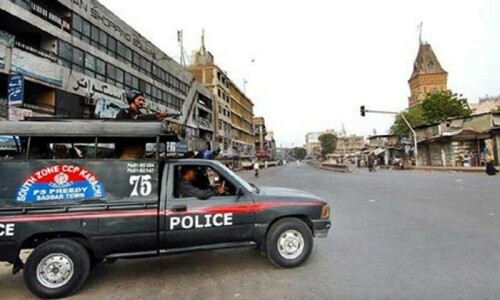Buggy
In English, ‘buggy’ means ‘a small car, often without roof or doors, used for a particular purpose’, says Oxford Advanced Learner’s Dictionary. We have heard of garden buggy, golf buggy and beach buggy, of course. The earliest usage of the word ‘buggy’ in English was recorded in 1773.
Historically, ‘buggy’ meant ‘a light carriage for one or two persons, drawn by a horse’, especially in the subcontinent. But the origin of the word ‘buggy’ is an enigma. Oxford English Dictionary says ‘buggy’ is “of unknown origin”. Webster’s dictionary says the origin of the word ‘buggy’ is “uncertain”.
In Urdu, the word is pronounced as ‘bugghi’ or ‘buggi’, with a geminated ‘g’ sound. The earliest usage of the word ‘bugghy’ in Urdu is recorded in Insha Allah Khan Insha’s poetry. Insha said:
Bagghiyaan noor ki tayyaar kar aye boo-i-saman
Ke hava khane ko niklen ge javanan-i-chaman
Insha died in May 1817, so its earliest usage in Urdu must have been recorded a bit earlier.
Some dictionaries have ventured out into determining the origin of the word, albeit without much clue. John T. Platts, for instance, in his ‘A Dictionary of Urdu, Classical Hindi and English’ (1884) says the word means “a kind of light chaise drawn by one horse, a buggy”, but he spells it in Roman Urdu as ‘bugghi’ and ‘baggi’. Platts thinks the origin of ‘buggy’ is Hindi but gives no roots or etymology. The problem with Platts is that he unnecessarily turns to Sanskrit roots to determine the origin of words and has even mentioned the origin of some Arabic words as of Sanskrit.
Urdu Dictionary Board’s 22-volume Urdu-to-Urdu dictionary says ‘bugghi’ has its origin in Hindi and refers it to as ‘buggi’. But the entry showing ‘buggi’ in the dictionary says the origin is ‘English: buggy’, which simply means the board has followed Platts here, who is as clueless here as the board.
Under the entry ‘buggy’, the compilers of Hobson-Jobson, — the famous dictionary of Anglo-Indian words used in English — say “though we trace the word much further back, we have not discovered the birthplace or etymology”. The Anglo-Indian Dictionary, compiled by George Clifford Whitworth, says it is a corruption of Gujarati word ‘bagi’. If ‘buggy’ is originally a Hindi or Gujarati word, the question is: how did it enter the English language in 1773?
We cannot say for sure if ‘buggy’ is a word from an oriental language or it has been borrowed from the West.
Bum-polis?
Another obscure word used in Urdu and Hindi is ‘bumpolis’. Though a slangy word, or colloquial at best, it is listed in some old as well as modern-day Urdu dictionaries, such as Ilmi Urdu Lughat by Waris Sirhindi and Qamoos-ul-Fasahat by Makhmoor Akberabadi. It means, according to these dictionaries: a public toilet.
After the publication of Noor-ul-Lughaat, an interesting debate had ensued in weekly Oudh Punch as to what was the origin of the word. The word ‘bumpolis’ (or bomb-police, or whatever is the correct spelling, because nobody knows for sure how to spell it and where it has come from) was mentioned in Noor-ul-Lughaat and the critics made fun of the etymology as Noor-ul-Lughaat says the word is a combination of “bum” (meaning buttocks) and “place”. But it is very doubtful as Noor-ul-Lughaat does not mention the English spellings of the word. S.W. Fallon has given the word in his A New Hindustani-English Dictionary, but has not given any English spellings or the etymology. Fallon has mentioned the Urdu pronunciation of the word in Roman letters, which is ‘bam-pulis’.
Interestingly, in a letter to the editor, published in Oudh Punch, a reader had suggested it was, in fact, a combination of ‘bum’ and ‘polis’ (which means a city), hence, the reader wrote, it makes sense to call a public toilet by such a name.
But the word is not to be found in modern-day English dictionaries. Urdu dictionaries do not mention the true origin and even Urdu Dictionary Board has blindly followed Noor-ul-Lughaat for the etymology of the word.
Bilty or bilti
In Urdu and Hindi, bilty (or bilti), means ‘a receipt showing the details of goods consigned’. It is issued by the transport company to the person consigning the goods. Platts says a ‘bilti’ is a bill of lading.
But what is the origin of the word? The word ‘bilty’ is not given in English dictionaries. Platts says it is a combination of the English word ‘bill’ and ‘i’, which is a diminutive suffix. Farhang-i-Asifiya says it is in fact ‘billet’, which seems very unlikely. We don’t know how the word ‘bilty’ was coined and how it came into use.
Published in Dawn, August 9th, 2021













































Dear visitor, the comments section is undergoing an overhaul and will return soon.